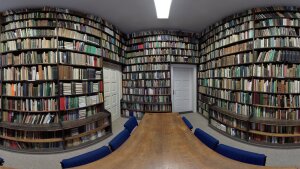
Your research opportunities on adult education and continuing vocational training
Teaching situation
Image: Dr. Beate GräfResearch is conducted in a network at our Chair: The results of your research are thus of great value and are used in society, educational policy, the research community and by our partners in practice. Current research results are directly incorporated into our teaching.
The Chair for adult education has the following research priorities:
- Basic research on adult education and self-development
- (Further) development of qualified employees, managers and entrepreneurs
- Participation research
- Programme development, transfer and evaluation research
- Future research on continuing education
Successful research through cooperation with the Department of Adult Education at the University of Jena
Our Chair is experienced in the coordination of international research projects and is happy to use this experience in cooperation with other institutions and individuals from the research community. Due to our (inter)national expertise in third-party funding, you will also benefit from a project partnership with us in third-party research.
We are always open to new scientific questions and research projects - please contact us.
Research in adult education as career development
Thuringian University and State Library
Image: Jan-Peter Kasper (University of Jena)In view of demography, globalisation, digitalisation and other factors accelerating the world of work, adult education is a field of research with a promising future. Through the consistent integration of our researchers in research projects, PhD graduates of our department have already been able to secure (inter)nationally responsible professional positions.
There are reasons for this: The Chair for Adult Education in Jena works on cutting-edge research topics in the field of continuing education. Our approach is characterised by transdisciplinarity, multi-methodology and takes into account complex theoretical foundations. Thanks to our long-standing practice transfer, we maintain a network with the most diverse practice partners.
We would be happy to discuss with you how our research goals and your career goals can be successfully combined.
Concluded Projects (Selection)
-
Women entrepreneurs
Transforming European Women´s Entrepreneurship: The Education and Training for Success Programme (women entrepreneurs)
The EU Entrepreneurship 2020 Action Plan recognises entrepreneurship and self-employment as key for achieving economic growth and for job creation. The under-representation of early stage women entrepreneurs in the business-driven economies of Europe is determined by various factors, such as socio-cultural, economic, and educational factors. To support women entrepreneurship there is a need for increasing the number of women entrepreneurs and for raising the performance and growth potential. Training and education play an important role in this regard. Relatively little research has been conducted to assess the impact of entrepreneurial education and training programmes. Training programmes today mainly address entrepreneurial behaviours. It is the aim of this proposal to get a better understanding of the fundamental entrepreneurial competences of early stage women entrepreneurs and to develop an educational and training programme that enables early stage women entrepreneurs to develop the fundamental competences to facilitate their entrepreneurial success.Funding period: 2015 - 2019
Grand number: 645441
Coordinator: Prof. Dr. Käthe Schneider
More details: women entrepreneursExternal linkConsortium: University of Jena, Germany; Universidad del Desarrollo, Chile; Cyprus University of Technology, Cyprus; University del Norte, Colombia; Imaginario, Colombia; 3s Unternehmensberatung GmbH, Austria
(This communication activity related to the action reflects only the author's view. The European Commission / Agency is not responsible for any use that may be made of the information it contains.)
-
Meanings and leadership effectiveness of managers
Meanings and leadership effectiveness of managers.
Comparison between Germany and USA - DFG-ProjektStudies show that managers display deficiencies in mental complexity, the complexity of meanings. A manager´s increasing mental complexity goes along with greater leadership effectiveness. An effective manager motivates people to achieve more than they would without management. Documented differences between German and American managers in humane orientation, which is fundamental to leadership, suggest differences in the creation of meaning and suggest a comparison of these learning processes between Germany and the USA. The expected new knowledge of the study for research on further education consists in gaining insight into those learning processes that lead to more complex meanings and to greater humane orientation of managers depending on the nation.
Applicant: Professor Käthe Schneider
Collaboration Partner: Professor Kathleen P. King, University South Florida -
Learning Transfer in Business Companies
Learning Transfer in Business Companies
The research project of the Chair for Adult Education consists of two parts: a descriptive benchmark study orientated towards corporate practice as well as an empirical research, which investigates the relation between learning transfer and corporate culture.The benchmark study determines which methods are used in companies in order to secure and evaluate learning transfer before, during and after continuing education events. Results of the online survey will be made available for all participants in an anonymised form, thereby creating a forum of interaction for Staff Development Departments. By establishing Best Practice as a desirable benchmark, companies get the opportunity to learn about their own position and to collect new ideas for internal further-training practices.
For the second survey, a relationship between corporate culture and learning transfer is assumed. Aspects of both constructs will be singled out and tested via a multivariate analysis. In this connection, the Job Commitment/ Job Involvement and the possibly consequential transfer motivation will be addressed.
Scientific management: Prof. Dr. Käthe Schneider
Research assistants: Dr. Helmut Stauche, Dr. Maria Pältz

